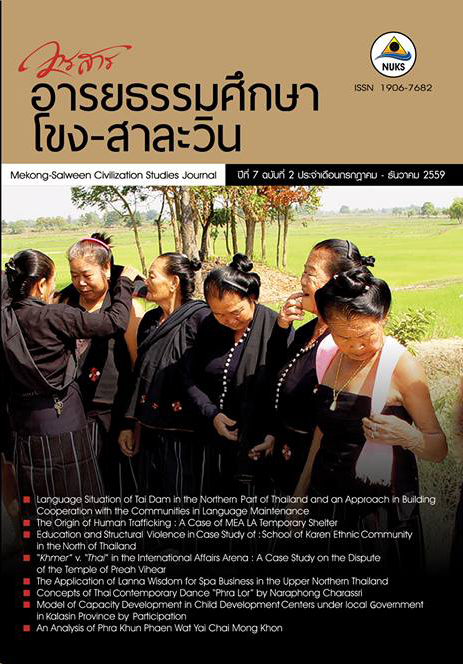Education and Structural Violence in Case Study of : School of Karen Ethnic Community in the North of Thailand
Main Article Content
Abstract
Education and structural violence in case study of: School of Karen
community in the north of Thailand, study is Type of structure violence that
is through the education system and has an impact on the way of the culture
of the people in the local community. The objective is to present and elucidate
that the education system is one part of the structure that influence violence
in Thailand towards indigenous communities and to present suggestions for
reducing violence influence by the education system through right based
approach and community empowerment in defining local education
Researchers used qualitative research data collection tools as in desk study
such as Study documents to know the origin of the school system in Karen
community.Participatory observation by participate in a workshop to writing
alternative report on the situation of access to quality and relevant education
for indigenous children and youth in Thailand of the Indigenous Peoples
Education Network (IEN) that include 15 organizations three times.
Observations of teaching in schools in Karen community for learn teaching
approach, activities in Schools and the class contents.In-depth interviews
8 people as the school board members, parents, students and teachers
And also In-depth interviews 3 directors working on alternative education
in Indigenous communities. The focus group discussion with Indigenous
Education Network Thailand to seeking suggestions for reducing violence
influence by the education system through right based approach and
community empowerment in defining local education.
In this paper elucidate that the education system is one part of the
structure that influence violence in Thailand towards indigenous communities
continuing since colonization age, nation building and communism age till
democracy and capitalism Age (present age) as follows; 1) Education’s kills
traditional ways of life. 2) Education condition for seized power of the
traditional structure of the community. 3) Education: Power and discourse
in contempt and discrimination. 4) Education for mono culture (Nationalism).
5) Education for detestation. 6) Education condition for kills Indigenous
Knowledge, confidence and pride. 7) Education created a selfish. 8) Education
the condition for pushes people to leave the community.
What needs to be conducted to reducing violence influence by the
education system through right based approach and community
empowerment in defining local education as follows: 1) Adopt and implement
a rights-based approach to education as guided in UNESCO document of
A Human Right Based Approach to Education for all; 2) Educational Structure
Specifically Designed for Ethnic and Indigenous Communities For formal
education. 3) Indigenous and ethno-linguistic minority children nationwide
must have access to MTB-MLE. 4) Adopt an affirmative recruitment policy
for local teachers who are able to fluently communicate languages of ethnic
and indigenous communities with basic understanding on their cultures.
5) MoE shall formulate Operational Guidelines and implement the National
Language Policy. 6) shall be encourage with more accessibility to alternative
forms of education with sufficient financial and other needed support in
addition to formal education, indigenous children and communities. 7) Shall
be established for monitoring, mobilizing with filling-up the gaps of
implementations given in this regard of Alternative Education Council.
8) Office of the Prime Minister shall seriously take actions upon the Cabinet’s
Resolutions, dated 3rd August and 2nd June 2010 which call for the restoration
of the traditional practices and livelihoods of the Karen and Chao-le (Sea
Gypsies) indigenous peoples. 9) For the development of a National Curricula,
human rights education is an integral part of the promotion and achievement
of stable 10) For the Education Assessment, the National Curricula allow to
be localized and should respond on the diverse values of local curricula
and contexts. 11) Capacity building for existing education personnel and
school management committees on “know how” and operationalization and
12) development of their professional teaching skills for the teachers who
are including those from government recruitment scheme, skilled and
knowledgeable community members, and local experts with special cultural
and technical knowledge and skills selected by communities.


